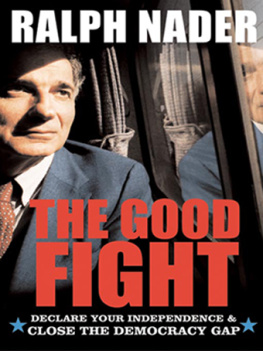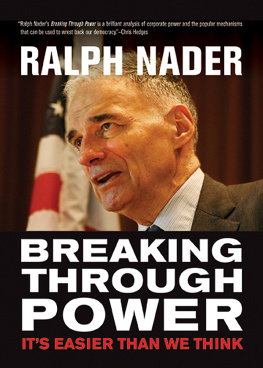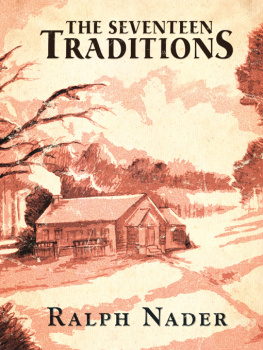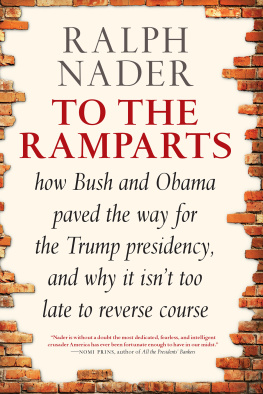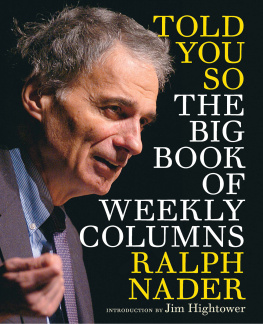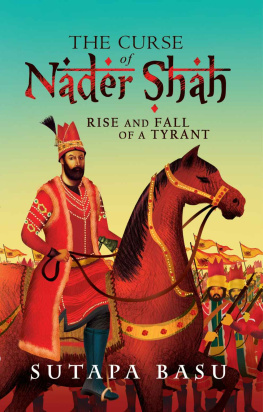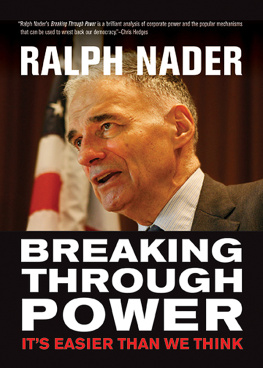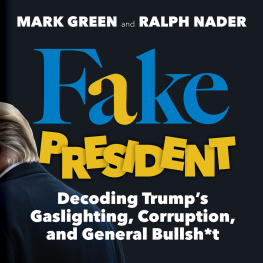F reedom is participation in power, said the Roman orator Cicero. By this deep definition, freedom is in short supply for tens of millions of Americans, a scarcity with serious consequences. This absence of freedom breeds apathy. Average citizens do not fight for change, even about the conditions and causes that mean the most to them. Our lack of civic motivation is the greatest problem facing the country today.
Our beloved country is being taken apart by large multinational commercial powers. Over two thousand years ago, in ancient Athens, a fledgling democracy challenged the longstanding plutocracy, using politics as its instrument. The struggle between these two forms of governmentone tending to place more power with the people and the other concentrating power in a few self-perpetuating handshas been going on ever since under various guises and disguises. Democracy, whether representative or more direct, brings out the best in people because it gives them more freedom, more voice, more lawful order, and more opportunity to advance their visions of a just society.
In our country, however, there is a gap that needs to be closedthe democracy gap. It is often said that power abhors a vacuum. When people do not claim power, the greedy step in to fill the void. Every day that capable citizens abstain from civic engagement allows our society and world to tolerate harm and to decay incrementally. The converse is also true. The tiny, cumulative efforts to build a more just society are comparable to the sources for a great river. The Mississippi River starts with a few raindrops in northern Minnesota. These raindrops merge into rivulets and then into brooks and then into streams and rivers that all swell into Americas priceless and mighty river. Similarly, our effortssmall and large, daily and cumulativespread the more noble sentiments of our humanity toward one another. But it isnt happening nearly enough to stem the downward slide of justice in our society.
Historic struggles for justice inform todays efforts to address contemporary injustices, and counter todays assault on fairness, decency, health, safety, and economic well-being. The media has been properly criticized for its massive tilt toward commercialism and entertainment, for reportorial staff cutbacks, remarkable redundancy, and neglect of citizen activities. Nonetheless, even with these and many other deficiencies of the ever-concentrated fourth estate, people are presented with more information about problems in their communities and nation than ever before. The vast amount of information available via the Internet complements and expands on reporting by the media. These should be additional motivating factorsbut still, despite the increased flow of information about the problems facing our society, citizens are not organizing to take corrective action. Why?
Of course, many individuals and groups do strive to improve society, but they cannot accomplish the dramatic progress of earlier activists because of the overall state of American politics. The occasional civic victory is nearly always defensivepreserving past gains or defeating bad amendments and nominations. If Truth in Advertising laws were applied to the Washington agencies, departments, and many congressional offices, the doors to these institutions would be adorned with for sale signs. Doors once open to civic community and nonprofit organizations pledged to press the needs of the people are now barricaded.
There are dozens of reasons for the lockouts, including: the Niagara of campaign cash flowing into both parties from the same business interests; the routine bipartisan appointment of corporate emissaries to high government posts (as with Federal Reserve Chairman Alan Greenspan and heads of the Departments of Treasury, Defense, and so on); the declining influence of trade unions; the expanding influence of global corporations able to take jobs abroad; the relentless hyper-organization of trade association lobbies and corporate law firms; the convergence of the two major parties on corporate power, contracts, subsidies, and reduced regulatory law and order; and the widening corporatization of media, religious institutions, and many universities.
As Republican author and corporate governance leader Robert Monks puts it, The United States is a Corporatist State. This means that individuals are largely excluded both in the political and corporate spheres. Indeed, the subjugation of civic values to commercial values represents one of the worst crises of our times.
Our country and its principles are abandoned by the very economic powers that control our destiny. Autocratic global corporations are deep into strategic planning. They openly and confidently strive to control our jobs; our environment; our political and educational institutions; our food, drugs, and other consumptions; our savings; our childhoods; our culture; even our genetic futures. Toward these ends, they incessantly move to control our elections and our governmental institutions. They lobby to limit our access to the courts and regulatory agencies, and block methods of law enforcement and exposure that would hold them modestly accountable for their more egregious wrongdoings. Is it not time for real people to plan for their own futures together?
The balance struck between democracy and plutocracy, between fair and unfair tax and budget priorities, between investor rights and corporate managers, between a government of the people, by the people and for the people, in Lincolns immortal words, and a government of the Exxons, by the General Motors; and for the DuPonts, determines the quality of our society. It is not coincidental that many centuries ago all the worlds great religions cautioned their adherents not to give too much power and position to mercantile interests. So too, our greatest presidents issued warning after warning about moneyed interests. Franklin Delano Roosevelt emphasized this in a message to Congress, The liberty of a democracy is not safe if the people tolerate the growth of private power to a point where it becomes stronger than the democratic state itself. That in its essence is fascism: ownership of the government by an individual, by a group or any controlling private power. We would do well to heed this age-old wisdom as we ponder why our corporate and political leaders assume more and more control over our lives and futures.
This loss of control is felt ever more deeply. A BusinessWeek poll in the year 2000 found 72 percent of the people believing that corporations had too much control over their lives. This was before exposure of the ongoing corporate crime wave that has looted or drained trillions of dollars from hardworking people. Society, like a fish, rots from the head down. Our leaders have been delivering for themselves and their circles, not for the people they allegedly serve. In return, too many people have been too trusting of, or resigned to, their leaders mass media rhetoric. Our static political system often leads our elected officials to do the opposite of what they say. Double talk.
With limited choices, people find it difficult to demand more from their leaders, or to have effective modes of measuring their performance beyond the blizzard of soothing words directed at them. This feeling of powerlessness, however, can be diminished. Powerless people often aggravate their situation by giving up on themselves. They dont believe theyre really capable of doing anything about the injustices affecting their families, their neighborhoods, and their communities. This makes them all the more susceptible to manipulation and flattery by unscrupulous power-brokers and their political proxies. This vulnerability results from the absence of an absorbed information base to provide a shield against artful propaganda and deception.

